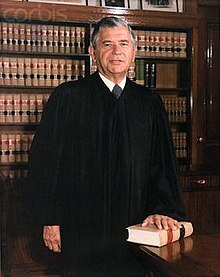Irving Kaufman
| Irving Kaufman | |
|---|---|
 |
|
| Chief Judge of the United States Court of Appeals for the Second Circuit | |
|
In office 1973–1980 |
|
| Judge of the United States Court of Appeals for the Second Circuit | |
|
In office 1961–1987 |
|
| Nominated by | John F. Kennedy |
| Judge of the United States District Court for the Southern District of New York | |
|
In office October 21, 1949 – September 22, 1961 |
|
| Nominated by | Harry S. Truman |
| Personal details | |
| Born |
June 24, 1910 Brooklyn, New York |
| Died | February 1, 1992 (aged 81) |
| Profession | Jurist |
| Religion | Judaism |
Irving Robert Kaufman (June 24, 1910 – February 1, 1992) was a federal judge in the United States. He is best remembered for imposing the death sentences on Julius and Ethel Rosenberg.
Born in Brooklyn, New York, Kaufman graduated from Fordham Law School at the age of 21. He was Jewish, but earned the nickname "Pope Kaufman" for his achievement in the required Christian doctrine classes at Fordham (a likely apocryphal story since the law school didn't teach Christian doctrine), a Catholic school. Kaufman worked for two decades as a lawyer in New York City, mostly in private practice but also as an Assistant United States Attorney. From 1949 to 1961, Kaufman served as a judge of the United States District Court for the Southern District of New York, to which he was appointed by President Harry S Truman. In 1961, President John F. Kennedy promoted Kaufman to an appellate position on the United States Court of Appeals for the Second Circuit. He served as an active Second Circuit judge from 1961 to 1987, including a term as Chief Judge from 1973 to 1980. Kaufman assumed senior status in 1987 but continued to hear some cases until his death four years later. On October 7, 1987, he was presented with the Presidential Medal of Freedom by President Ronald Reagan. He died on February 1, 1992 at Mount Sinai Medical Center in Manhattan of pancreatic cancer. He was 81 years old.
...
Wikipedia
